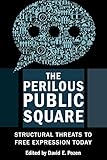The Perilous Public Square : Structural Threats to Free Expression Today / ed. by David E. Pozen.
Material type: TextPublisher: New York, NY : Columbia University Press, [2020]Copyright date: ©2020Description: 1 online resourceContent type:
TextPublisher: New York, NY : Columbia University Press, [2020]Copyright date: ©2020Description: 1 online resourceContent type: - 9780231197120
- 9780231551991
- 342.7308/53 23
- online - DeGruyter
| Item type | Current library | Call number | URL | Status | Notes | Barcode | |
|---|---|---|---|---|---|---|---|
 eBook
eBook
|
Biblioteca "Angelicum" Pont. Univ. S.Tommaso d'Aquino Nuvola online | online - DeGruyter (Browse shelf(Opens below)) | Online access | Not for loan (Accesso limitato) | Accesso per gli utenti autorizzati / Access for authorized users | (dgr)9780231551991 |
Frontmatter -- CONTENTS -- INTRODUCTION -- 1. IS THE FIRST AMENDMENT OBSOLETE? -- 2. FROM THE HECKLER’S VETO TO THE PROVOCATEUR’S PRIVILEGE -- 3. STRAINING (ANALOGIES) TO MAKE SENSE OF THE FIRST AMENDMENT IN CYBERSPACE -- 4. INTERMEDIARY IMMUNITY AND DISCRIMINATORY DESIGNS -- 5. THE DE-AMERICANIZATION OF INTERNET FREEDOM -- 6. CRISIS IN THE ARCHIVES -- 7. AUTHORITARIAN CONSTITUTIONALISM IN FACEBOOKLAND -- CONTRIBUTORS -- INDEX
restricted access online access with authorization star
http://purl.org/coar/access_right/c_16ec
Americans of all political persuasions fear that “free speech” is under attack. This may seem strange at a time when legal protections for free expression remain strong and overt government censorship minimal. Yet a range of political, economic, social, and technological developments have raised profound challenges for how we manage speech. New threats to political discourse are mounting—from the rise of authoritarian populism and national security secrecy to the decline of print journalism and public trust in experts to the “fake news,” trolling, and increasingly subtle modes of surveillance made possible by digital technologies.The Perilous Public Square brings together leading thinkers to identify and investigate today’s multifaceted threats to free expression. They go beyond the campus and the courthouse to pinpoint key structural changes in the means of mass communication and forms of global capitalism. Beginning with Tim Wu’s inquiry into whether the First Amendment is obsolete, Matthew Connelly, Jack Goldsmith, Kate Klonick, Frederick Schauer, Olivier Sylvain, and Heather Whitney explore ways to address these dangers and preserve the essential features of a healthy democracy. Their conversations with other leading thinkers, including Danielle Keats Citron, Jelani Cobb, Frank Pasquale, Geoffrey R. Stone, Rebecca Tushnet, and Kirsten Weld, cross the disciplinary boundaries of First Amendment law, internet law, media policy, journalism, legal history, and legal theory, offering fresh perspectives on fortifying the speech system and reinvigorating the public square.
Mode of access: Internet via World Wide Web.
In English.
Description based on online resource; title from PDF title page (publisher's Web site, viewed 27. Jan 2023)


